Install Windows 10 with USB BOOT quickly, with detailed standards from A to Z
Even though Windows 11 has been released, many people are still not used to using this version because the interface has changed quite a lot, so they choose to download and install Windows 10 on computers and laptops.
Article content:
1. How to create a USB Boot to install Windows 10
1.1 Standard Windows 10 ISO file from Microsoft
1.2 How to create a Windows 10 installer from USB
1.3 Set up BIOS to install Windows 10 using USB BOOT
2. How to install Windows 10 in detail , latest
3. Some errors when installing Windows 10 using USB
3.1 Error Required CD/DVD drive device driver is missing.
3.2 Error cannot create USB Boot
3.3 Error cannot enter BIOS
3.4 Error The selected disk has an MBR partition table. table
1. How to create USB Boot to install Windows 10
1.1 Download the standard Windows 10 ISO file from Microsoft
First, you need the latest version or download Win 10 directly on TipsMake via the link below.
- Download link
1.2 How to create Windows 10 installer on USB (USB BOOT Win 10)
After you have the Windows 10 ISO file and USB, you need to install the USB so that it can contain the Windows 10 installer. Refer to the article below to Know how to create a USB containing the Windows 10 installer.
- Detailed steps to create an installer from USB, you can follow and follow in the article.
1.3 Set up BIOS to install Windows 10 using USB BOOT
This step is necessary for some machines that do not automatically boot from USB. To adjust, go to BIOS by:
- When starting, press DEL, F8, F10 ,. Note that this method depends on each different model, you can see how to enter the bios of popular laptop models. Now here, it will appear at startup so anyone with sharp eyes will see it. After entering the BIOS, go to the section to select the boot order to load the operating system from USB.
To be able to adjust the Bios to boot from USB or DVD/CD to install Windows to enable the ability to boot into the operating system from the first USB, CD/DVD, please refer to the instructions for adjusting the Bios to boot from USB or DVD/ Windows installation CD for all computer models to do this.
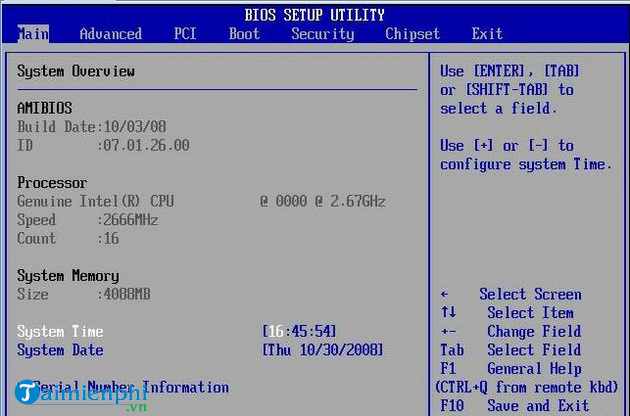
After understanding the shortcuts to move in Bios mode on your computer, move to the BOOT tab --> Then select Removable Devices (On some other models it is also called USB Storage Device or External Drive)
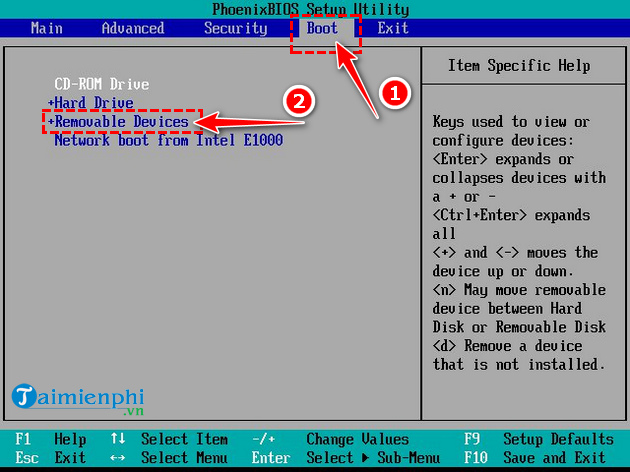
2. How to install Windows 10 using USB BOOT in detail
Step 1: Set the time and keyboard, then click Next
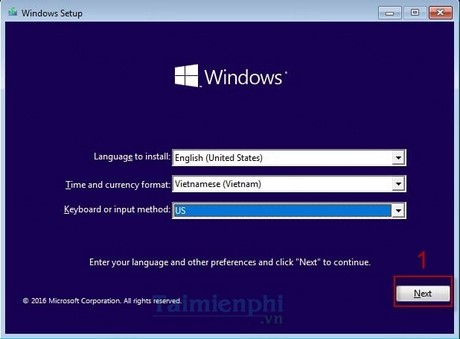
Step 2: Click Install now
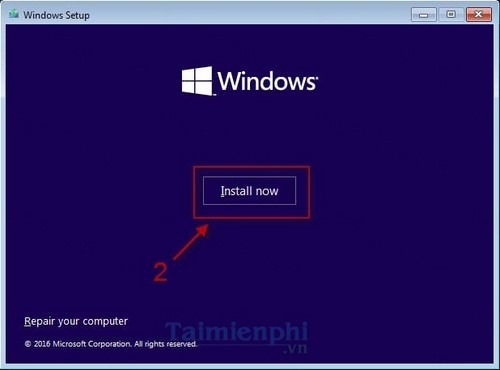
Step 3: Click I don't have a product key
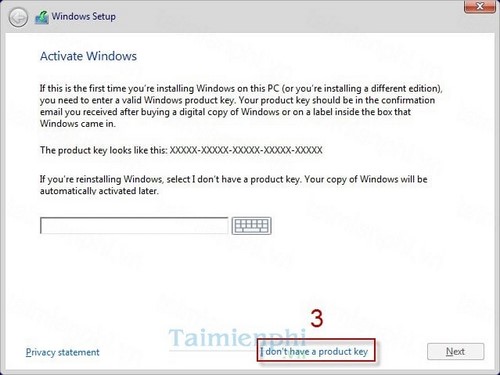
Step 4: Select the Windows 10 operating system you want to install, then click Next.
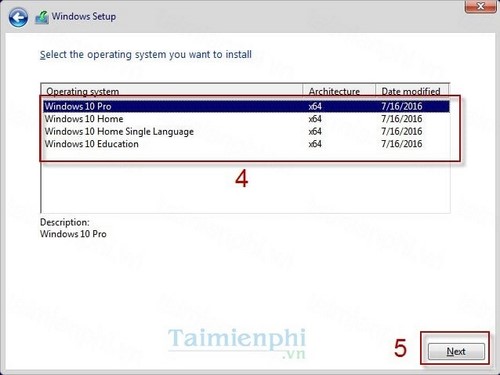
Step 5: Check I accept the license terms then click Next
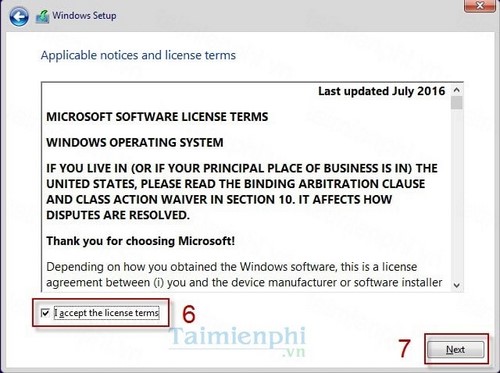
Step 6: Select Custom: Install Windows only (advanced)
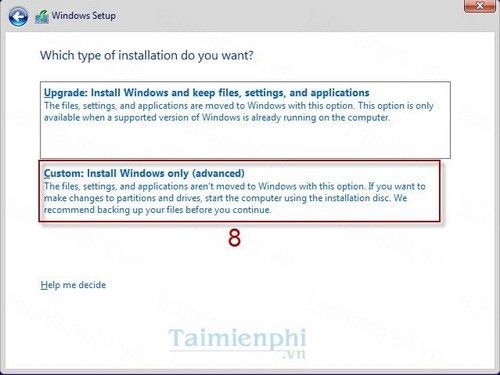
Step 7:
- To reinstall Windows 10: Select the drive to install, then click Format to delete all old data on the drive where Windows is installed and finally click Next .
- For new installation of Windows 10: Select the hard drive you want to install the operating system on, click Next
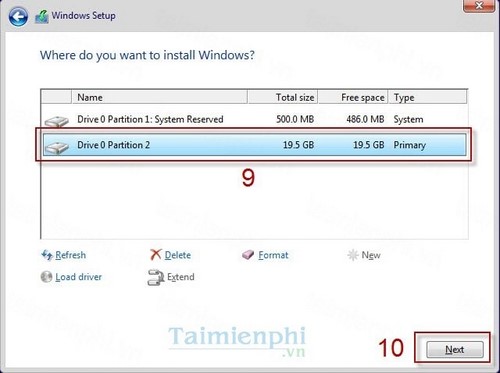
Step 8: The installation process will take about 10-15 minutes depending on how fast or slow your computer configuration is.
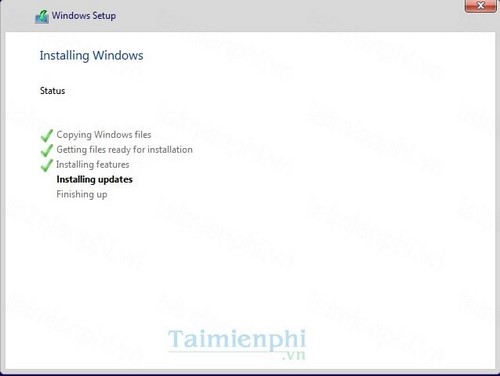
Step 9: After installation is complete, the device will reboot and return to the first-use setup screen.
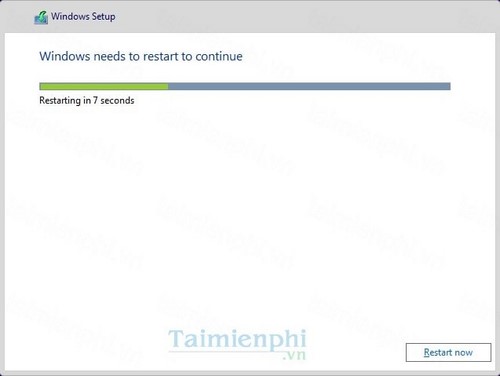
Step 10: Click Use Express settings to automatically set up the device for the first time use, click Customize to customize the settings yourself.
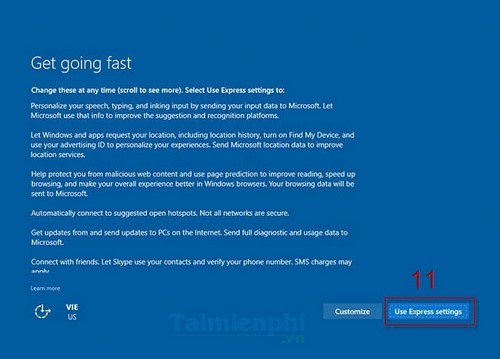
Step 11: Select I own it then click Next
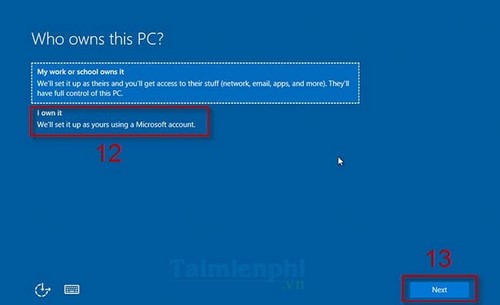
Step 12: Click Skip this step to skip the Microsoft account login step
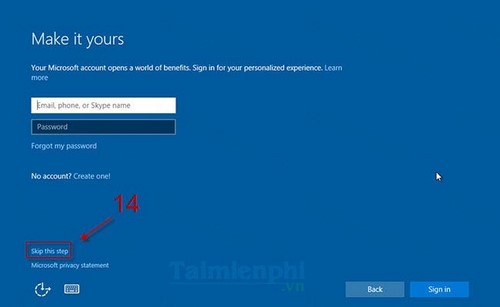
Step 13: Create a login account and login password for your computer
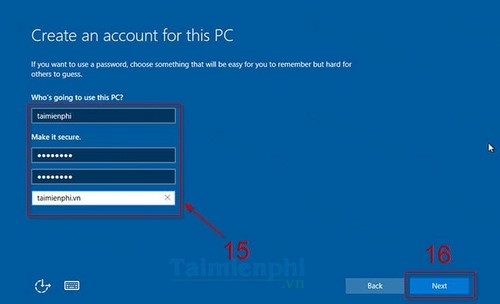
Step 14: Click Not now to temporarily skip using Cortana virtual assistant
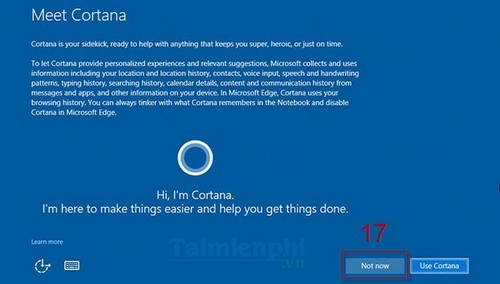
Step 15: Wait a moment for the device to set up for the first run, do not turn off the device during this time.
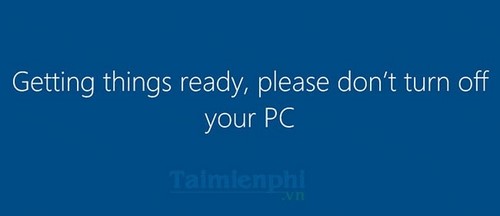
And now you can use Windows 10 on your computer
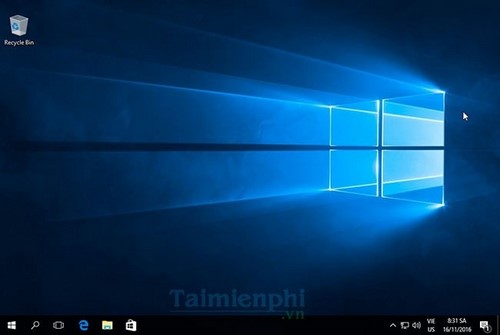
3. Common errors when installing Windows 10 using USB BOOT
3.1 Error Required CD/DVD drive device driver is missing.
- The cause of this error may come from: The Windows 10 installation file is corrupted, the USB was removed during the installation process, the drive on the installation computer Windows 10 cannot read data.Taimienphi.vn has an article with detailed instructions on how to fix this problem. You can refer to how to fix Required cd/dvd drive device driver is missing error to fix.
3.2 Error of not being able to create USB Boot
- The cause of this problem is because the autorun file when installing USB Boot has a capacity of 0KB. If the USB Boot is successfully created, this file will have a capacity of 1KB. To fix it, you need to turn off the program and anti-virus software installed on your computer, then recreate the USB Boot.
3.3 Error of not being able to enter BIOS
- Each computer has different shortcuts to enter BIOS mode. If you cannot access this mode, you need to immediately refer to how to enter the bios of laptop computers to find the brand you are using to reinstall Windows 10.
3.4 Error The selected disk has an MBR partition table
- This error occurs when you create an incorrect USB Boot. For example, if your computer has the Legacy format but you create a UEFI USB Boot, you will encounter errors and vice versa. To fix the error, follow the steps in the article Fixing The selected disk has an MBR partition table error to fix it.
After installing Windows 10 as well as upgrading from lower operating systems, if you are not satisfied, you can downgrade Windows 10 to Win 7 or 8.1 to return to using your old operating system.
In the above article, we guide you to directly install Win 10 on your computer to use; If you don't want to install Win 10 directly, you can install Win 10 in parallel with Win 8 or Win 7 to be able to use the familiar operating system as well as experience the latest features of the Win operating system. 10 currently.
Besides installing Windows 10 to run in parallel with lower operating systems, you can also install Windows 10 on a vmware virtual machine to use. Currently, VMWare is one of the effective virtual drive creation software on computers, helping to You can install any operating system to use.
In addition to the two ways we mentioned above, Ghost win 10 is also a useful choice for you in case you want to reinstall your computer without wasting much time. There are many ways to ghost Windows 10 for you to choose from. Depending on your needs and device, choose the most suitable method for yourself.
Currently, many users install Win 10 with the desire to have a better experience than previous operating systems. You can install Windows 10 using ISO, hard drive, USB, virtual drive or DVD on your computer.
Windows 10 as well as other versions such as Windows 7, Windows 8 or Microsoft's 8.1 all have different installation methods for computers. With Win 7, users can have many different ways to install Windows 7 such as from DVD, USB or even conveniently install directly on the hard drive.
Besides, when you want to use Win 8, you can install it just like Win 7, the way to install Win 8 compared to Win 7 is not much different. And on Windows 10, the methods used with Win 8 will also be applied to the latest version of Microsoft so that users can easily visualize and apply settings when necessary.
When using Windows, you will encounter a security notification panel that annoys you. Refer to how to turn off the security alarm on Windows to know how to hide this notification every time you install or upload a new application. your computer.
As announced, Windows 10 was introduced as the next version of the Windows operating system after the previous version of Win 8.1, with a series of improved features from Win 7 and Win 8.1 that users were used to before.
The latest version of Windows 10 is the Windows 10 Creators Update with many newly updated features as well as upgrades and bug fixes in the previous version. If you are using Windows 10, you can upgrade to Windows 10 Creators Update or if using Windows 8.1 or lower, install Windows 10 Creators Update through TipsMake's article on how to install Windows 10 Creators Update using USB.
You should read it
- ★ Install Windows 10 with a super fast USB in just a few simple steps
- ★ Install Win 10 for Android tablet
- ★ How to install Windows 7 using USB - Create a bootable USB to install Windows 7
- ★ Install Windows XP from a USB Flash drive
- ★ How to install Windows 11 iSO by USB, for machines that do not support